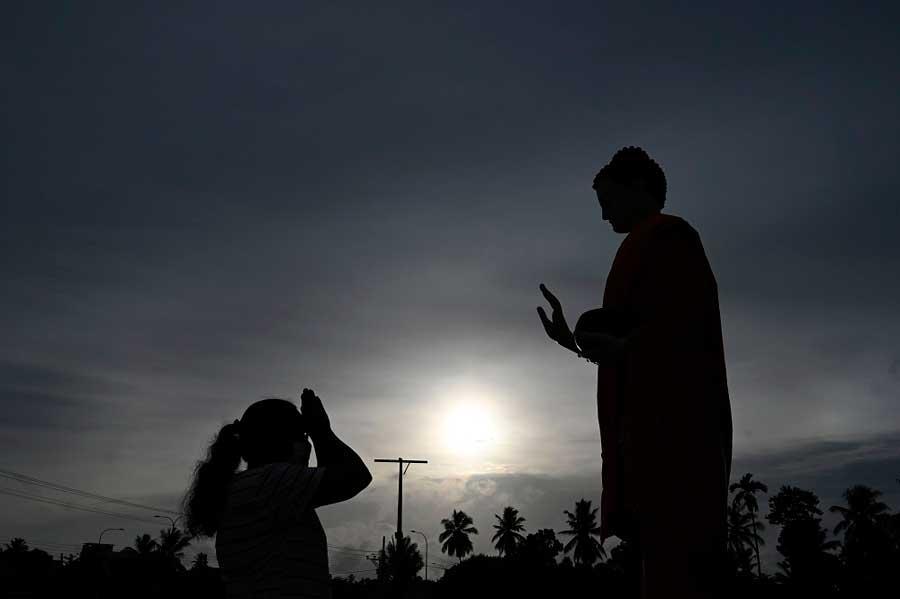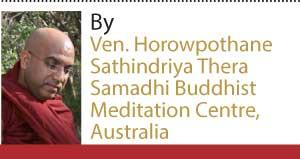26 May 2021 - {{hitsCtrl.values.hits}}

The Blessed One compassionately constituted disciplinary codes and standards of behaviour for his followers (PIC AFP)
“Monks, there is one person arising in the world who is unique, without a peer, without counterpart, incomparable, unequaled, matchless, unrivalled, the best of humans.
unequaled, matchless, unrivalled, the best of humans.
Who is that person? It is the Tathagata, the Arahant, the Fully Enlightened One. This is that one person….”
(The Buddha – Anguttara Nikaya)
Today (May 26) marks Vesak Poya day. Today is the 2565th anniversary of the celebration of the life of the great master the Gautama Buddha.
In order to pay my homage and respect to the Blessed One, I thought to elaborate and inscribe some profound characteristics of the Buddha on this significant day.
Twenty-six centuries ago the birth of prince Siddhartha was dawn in the history of mankind. Later, at the age of 35, by becoming a Buddha, he pragmatically accomplished his spiritual aspiration.
The present day global atmosphere is inconceivable and unprecedented with the whole human society changed by the COVID-19 pandemic.
"This is the precise time to reflect upon the inner qualities of the Buddha and what he encouraged us to do"
This is the precise time to reflect upon the inner qualities of the Buddha and what he encouraged us to do.
The uniqueness of the Buddha is beyond comparison. He was a paragon of virtue, model of perfection, an embodiment of morality, a paradigm of impeccable personality and an incomparable immaculate spiritual leader who compassionately taught, guided and encouraged humanity towards achieving innermost peace and happiness.
“The excellent one, knower of excellent,
Giver of excellent, bringer of the excellent,
The unsurpassed one taught the excellent Dhamma.
This too is the sublime gem in the Buddha.”
(Ratana Sutta)
Once the Buddha was asked thus by Dandapani the Sakyan thus:
“What does the recluse assert, what does he proclaim?
Then, the Blessed One explicitly and precisely elucidated thus:
“Friend, I assert and proclaim such a teaching that one does not dispute with anyone in the world with its gods, its Maras, its Brahmas, in this generation with its recluses and brahmins, its princes and its people; such a teaching that perceptions no more underlie that brahmin who abides detached from sensual pleasures, without perplexity, shorn of worry, free from craving for any kind of being.” (Madhupindika Sutta)
He faced inconceivable challenges, but he patiently overcame and assiduously conquered them with courage and perseverance. With dedication and paramount persistency, he conquered the battle of defilements and impurities by treading the Noble Eightfold Path or Path of Purification.
"Though some cultural values and ethnic practices are acceptable some are controversial and inconsistent with Buddha’s teachings"
After an extensive and amicable discussion with the Buddha one of the dedicated devotees of Nigantanataputta called Upali impressively extolled and glorified the Buddha in front of his devoted teacher thus:
He is the wise one who has cast off delusion.
Abandoned the heart’s wilderness,
Victor in battle, he knows no anguish, is perfectly even-minded,
Mature in virtue, of excellent wisdom,
Beyond all temptations, he is without stain,
The Blessed One is he, and I am his disciple.
The first Prime Minister of India Pandit Jawaharlal Nehru in his book The Discovery of India has mentioned about the Gautama Buddha in the following manner:
“The ages roll by and the Buddha seems not so far away after all; his voice whispers in our ears and tells us not to run away from the struggle but, calm-eyed, to face it, and to see in life ever greater opportunities for growth and advancement. Personality counts today as ever, and a person who had impressed himself on the thought of mankind as the Buddha has, so that even today there is something living and vibrant about the thought of him, must have been a wonderful man – a man who was, as Barth says, ‘the finished model of calm and sweet majesty, of infinite tenderness for all breathes and compassion for all that suffers, of perfect moral freedom and exemption from every prejudice.”
“His message old and yet very new and original for those immersed in metaphysical subtleties, captured the imagination of the intellectuals; it went deep down into the hearts of the people.”
Even though a man is intoxicated with the advancement of modern technology and development of information technology, there is no remedy or therapy for mental agonies, and psychological afflictions.
The whole global society has been traumatised by the present pandemic. Nearly three and half millions of lives have perished. People are in fear. During his forty-five year mission he compassionately advised multitudes of people how to manage one’s earnings. In the Sigalovada Sutta a young student was advised how to allocate funds in three aspects and facets by the Buddha.
If political leaders, professionals and authorities, and ordinary individuals are truly and pragmatically mindful of Buddhist economic management no one would meet challenges like in present times.
“This Dhamma that I have discovered is deep, hard to see, hard to understand, peaceful and sublime, not within the sphere of reasoning, subtle, to be experienced by the wise. But this generation delights in adhesion, takes delight in adhesion, and rejoices in adhesion. For such a generation this state is hard to see, that is, specific conditionality, dependent origination. And this state too is hard to see, that is, the stilling of all formations, the relinquishment of all acquisitions, the destruction of craving, dispassion, cessation, Nibbana.”
“Surveying the world with the eye of a Buddha, the Blessed one saw beings with little dust in their eyes and with much dust in their eyes, with keen faculties and with dull faculties, with good qualities and with bad qualities, easy to teach and hard to teach, and a few who dwelt seeing blame and fear in the other world”
Above mentioned profound words of the Buddha which stated twenty-six centuries ago explicitly reveal the authenticity and the purity of the Buddha-Dhamma. These words are more than enough to understand the essence of what the Buddha realised.
Regarding Buddhism numerous interpretations and expositions have been given by foremost scholars who have immensely studied Buddhism.
However, twenty-six centuries ago, DHAMMA-VINAYA is the exclusive and peculiar word Buddha pronounced to grasp his teachings.
Some scholars have characterised and distinguished the teachings of the Buddha as a way of life and as a philosophy.
It is the path to purification and freedom. It is a path to liberation from all bondages and cruelty and leads to happiness.
It is unthinkable to define and describe what the Buddha said in few words.
DHAMMA – The truth – is what he realised and offered as his advice to eliminate suffering.
VINAYA- Discipline is what the Blessed One compassionately constituted as disciplinary codes and standards of behaviour for his followers.
At present Buddhist living in so-called Buddhist countries have added their own cultural aspects and practices to Buddhism.
Though some cultural values and ethnic practices are acceptable some are controversial and inconsistent with Buddha’s teachings.
We are in the climax of the development of science and technology. We call it the new millennium and digital age.
Specially, we are in a global village now.
Our young generation is well equipped with the knowledge of modern science and well advanced in nano technology. They curiously question and challenge us to find what exactly the Buddha said. Now outdated rites and rituals are questioned by youth.
Now Buddhism has been politicised and modified by some hypocritical politicians and monks who support corrupt lawmakers to deceive innocent citizens. It is completely contrary to what the Buddha taught.
Unfortunately, most born Buddhists accept what these hypocrites do, but in Buddha-Dhamma there is no room at all for these blind faiths and beliefs.
Be wise to understand what the Buddha said and be honest to be a pragmatic disciple of the Buddha.
Some psychopaths and psychoneurotic people blindly claim that Gautama Buddha was born and lived in Sri Lanka. They want to have a Sinhalese Buddha rather than THE BUDDHA.
Hope that our wise scholars and professionals who truly respect and practice what the Buddha said will take necessary action to eradicate these toxins from our society.
26 Nov 2024 8 hours ago
26 Nov 2024 9 hours ago
26 Nov 2024 26 Nov 2024
26 Nov 2024 26 Nov 2024
26 Nov 2024 26 Nov 2024